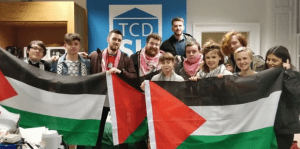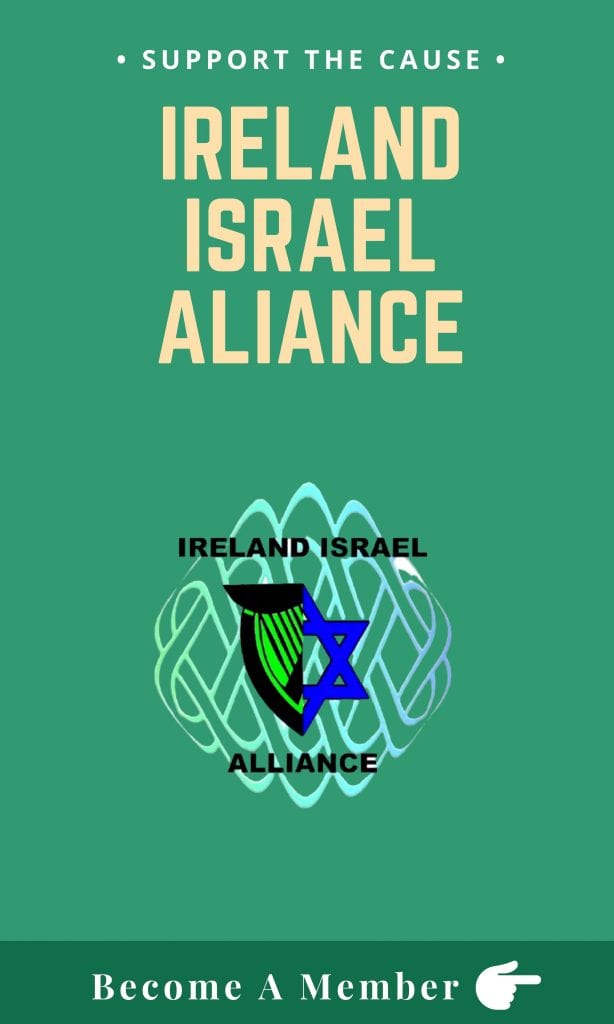The Anglo-Celt’s readers were presented with a highly biased and sometimes completely inaccurate account of the Israel-Palestine issue.
In the June 1st edition of the Anglo-Celt (a local newspaper published in Cavan town in the north Irish midlands), an article was published entitled “When perception meets reality – the Palestinian plight”. The article was highly partial and very anti-Israel with no attempt being made to present the Israeli side of the Israel-Palestine issue.

It’s fair to concede that not every article in every newspaper needs to be perfectly balanced. Polemics do have a role in journalism. They can initiate a debate, encouraging people from the other side of the argument to get involved. Such debates do tend to increase people’s knowledge of an issue. At the time of writing, after a period of correspondence with the editorial team, the newspaper does seem to be willing to allow a letter to be published refuting some of the points.
The rest of this write-up will deal with problematic points in the article – refuting each one in turn.
Palestinian refugees
The author mentions the issue of Palestinian refugees. Firstly, there would be no Palestinian refugees if Palestinian leaders and neighbouring Arab countries had accepted the United Nations partition plan laid out in 1947. There would have been two states in the region – Israel and a Palestinian state. Instead, Arab countries invaded Israel from three sides thinking that they’d wipe out the fledgling state. There’s little doubt that some Palestinians did flee from their homes out of fear of the advancing Israeli forces but even Palestinians admit that Arab leaders told some of them to temporarily evacuate their homes on the assumption that they could return after a quick Arab victory when all the Jews had been slaughtered.
Tragic though the situation of Palestinian refugees is, the number of Jewish refugees who were forced to leave Arab and Islamic countries in the 1940s, 1950s and 1960s is significantly larger. The graffiti on the walls and the cries of the mobs of Arab cities from Morocco to Iraq told Jews to get the hell out of there and go to Israel. And that’s what they did. These Jewish refugees and their descendants are now the majority of the Jewish population of Israel.
Do these Jewish refugees and their descendants now living in Israel get any international aid as Palestinian refugees do? Is there a special UN body that seeks assistance from world governments specifically on their behalf – such as the UNRWA for Palestinian refugees? Has anyone signed petitions or protested outside Arab embassies to highlight the plight of these Jewish refugees? No. We don’t hear anything about them because they settled down and got on with their lives in Israel.
Meanwhile, people of Palestinian origin in Arab countries are denied citizenship and barred from many professions. According to Human Rights Watch, Palestinians living in Lebanon face restrictions on their right to work and own property. Palestinians in Egypt also face major obstacles, including formidable travel restrictions and a lack of access to basic government services, such as free education.
As recently as 2017, the Iraqi president approved a law that stripped Palestinians living in Iraq of their rights and classifying them as foreigners. Meanwhile, in Syria, the Bashir Al-Assad regime has carried out massacres against people of Palestinian origin during the Syrian civil war with particularly horrific atrocities being carried out in the Yarmouk district of Damascus. Is it not strange that so many people who profess to be concerned with the plight of Palestinians never mention how they are mistreated by their fellow Arab “brothers”?
The “struggle” for a Palestinian state
Another point raised refers to “the struggle [of the Palestinian people] to have Palestine recognised as an independent state from Israel”. This independent state – we are told – would consist of Gaza and the West Bank. This doesn’t accord with the facts. The two main Palestinian factions (Fatah and Hamas) have both made it quite clear that they don’t just want Gaza and the West Bank. Their aim is to wipe the modern state of Israel off the map.
Of course, the reason that Israel ever had a presence in either territory was that it was attacked from both territories (and all along its southern, eastern and north-eastern borders) in 1967 in a war launched by far larger Arab neighbours. Israel won that war and survived. It quickly offered to return all territories it had taken in the war in exchange for peace with its Arab neighbours. This offer was contemptuously dismissed by those same Arab countries at a meeting in Khartoum (Sudan) in September 1967.
Nevertheless, over time, the conflict did begin to thaw out. Israel handed back the Sinai Peninsula to Egypt in exchange for a peace treaty in 1979. A similar treaty was reached with Jordan in 1994 and in 2000, Israel ended its presence in Lebanon. Israel unilaterally left Gaza in 2005 – unilaterally meaning that there was no peace agreement to protect Israel’s border areas.
Since then, as a result of Israel’s ending its presence in Gaza, the villagers of southern Israel have regularly had to deal with unprovoked barrages of missiles from Gaza. The Palestinian authorities in Gaza didn’t use their newly liberated half of a future Palestinian state to improve the well-being of Gazans. No, their number one priority was (and is) slaughtering Israelis.
The Anglo-Celt article claims that Israel restricts the movement of Palestinians within Gaza, stopping them from moving from one part of the territory to other parts. But this is completely untrue. Israel hasn’t administered Gaza since 2005. It ended its presence there 18 years ago. How could Israel possibly be preventing Gazans from moving around within Gaza?
Israel has made numerous attempts at peace over the last few decades: in 1967, 1995, 2000, and 2008. In the 2008 negotiations, the main Palestinian negotiator (Saeb Erekat) has confirmed that the then Israeli Prime Minister (Ehud Olmert) accepted all of the Palestinian demands and even offered more than the full area of the West Bank, along with Gaza.
Yet Palestinian president Mahmoud Abbas still rejected the offer and made no counter-offer. Not for the first time, the Palestinian response was just “No!”. Neither of the main Palestinian factions (who incidentally hate each other as much as they hate Israel) have ever shown any interest in peace. Instead, they incite their populations to carry out terror attacks on Israelis. In the case of Fatah, under the so-called “pay for slay” program, they actually pay “salaries” to those convicted of attacking Israelis. So, the implication throughout the Anglo-Celt article that Israel is the main obstacle to the emergence of a Palestinian state is highly misleading.
The apartheid canard
In another of the misleading points raised, the article accuses Israel of “apartheid”. This does a grave injustice to Israeli society and is insulting to black people who were victims of real apartheid in pre-1994 South Africa as it implicitly minimises the injustices visited upon them. They had no vote, they had to use separate schools, hospitals, cinemas, restaurants, public transport and even different platforms at train stations.
Israeli Arabs experience nothing like this. They are free to go wherever they want and choose whichever career they wish. There are Arabs in the Israeli parliament and in the upper echelons of the Israeli military. There are Israeli-Arab ambassadors, Israeli-Arab Supreme Court judges, and Israeli Arabs who are CEOs in some of the largest companies in Israel. Of course, they have the vote and have had since the State of Israel was founded – something that no other Arab community can claim across a vast swathe of territory from Morocco to Afghanistan. What do you call an Arab who has been able to vote regularly in elections for the past 75 years? Answer: an Israeli-Arab.
Reference has already been made above to the issue of Jewish refugees who were forced to leave Arab and Islamic countries. Is this not the “best” form of apartheid – to drive a community out of their country and force them to move to another country? Arab states from Morocco to Iraq don’t need laws against Jews any more because they forced out their ancient Jewish communities through discrimination, violence, disenfranchisement, revocation of citizenship and seizure of assets.
It’s ironic that so much time is spent by Irish journalists and politicians lambasting Israel on its treatment of Arabs. By every measure of progress – education, health, wealth, quality of life etc. – Israeli-Arabs are doing far better and are accorded far more respect by their compatriots than Irish Travellers. Perhaps we need to look closer to home at the ills of Irish society rather than pointing the finger at another country that’s thousands of kilometres away.
Israeli “terrorism”
The article makes a vague reference to “Israeli terrorism” with no concrete examples being given as to what the author means. So, it’s impossible to know what is being referred to. The quote from Sinn Féin TD Chris Andrews (who is happy to appear in photos shaking hands with the Butcher of Damascus, Bashir Al-Assad) is ironic – given that Sinn Féiners have NEVER condemned any attacks on Israelis but are guaranteed to issue hysterical condemnations as soon as Israel retaliates.
Despite what Andrews and others might say, it’s not terrorism for Israel (or any country) to respond to missile attacks on its territory and if the Palestinian authorities in Gaza are trying to bomb communities in southern Israel, no-one should be surprised if Israel responds. It can’t be denied that more Palestinians get killed in these exchanges than Israelis but that’s because the Israelis have expended huge amounts of money, time and research effort to develop systems that stop the Palestinian missiles from killing more of their people. It’s on this point that commentary tends to get particularly perverse and simplistic.
More Palestinians are being killed, so the Palestinian militants are the underdogs and therefore, they’re the good guys. Because the Israelis protect their civilian population, that makes them the bad guys. This line of thinking pointedly ignores the fact that Palestinian militants have no compunction in using residential areas, hospitals, schools and even places of worship as bases for these attacks – with the obvious intent that an Israeli response will inadvertently kill civilians and provoke international condemnation.
The joke that the acronym HAMAS (the regime that rules Gaza) stands for “Hiding Amongst Mosques And Schools” has more of an element of veracity about it than the vast majority of punchlines. And the adage still holds true: Israeli people can shield themselves behind their military but Palestinian militants shield themselves behind their people.
Israel’s blockade on Gaza
The article claims that “Palestinians [are] restricted from moving between Gaza and the West Bank”. It is correct to say that not everyone from Gaza who wants to travel across Israel to get to the West Bank is allowed to do that. Some Gazans have used the access granted to commit terrorist attacks on Israeli civilians while on Israeli soil and the suspicion was that the access was requested just to commit the attacks.
Fundamentally, with the exception of refugees, no country is legally obliged under international law to grant access to its territory for people from another jurisdiction. This applies especially when the authorities in that jurisdiction (as in the case of Gaza) regularly launch missile attacks on the country to which the people are seeking access.
Gaza has a border with Egypt and it should be possible for Gazans to cross the border into Egypt and organise whatever onward access they need from there. However, Egypt’s restrictions on Gaza are stricter than those of Israel’s. This is because the Hamas regime in Gaza is allied with the Egyptian Muslim Brotherhood which is regarded as a terrorist group in Egypt as it has carried out terror attacks in that country.
There is a recurring theme with Palestinian leaders and factions: their unfailing ability to alienate not just Israelis but also regimes, governments and countries that should be allies. Egypt should be a natural friend for people in Gaza. Unluckily for Gazans, they’re ruled by an undemocratic regime that’s more concerned with killing Israelis than with the well-being of Gazans.
Zionism as an “extremist movement?
Like it or not, but western society is based on the nation state and however imperfect that construct might be, it has given Europe its longest period of comparative peace in centuries and probably millennia. There were the wars in Yugoslavia in the 1990s but it could be argued that that was one more step in the breakdown of a multinational state into several nation states. Obviously, there is the more recent invasion of Ukraine by Russia but there is always the possibility that one state will want to seize the territory of a neighbouring state. The Russians have already tried it with Moldova and Georgia.
One way or another, it is generally accepted that it’s no bad thing for a people to aspire to their own state. If it’s okay for Irish people, Finnish people, Greek people and Albanian people to want to have their own state, then how can it be a problem for Jewish people to aspire to the same? Zionism is just that: the aspiration of Jews to have their own state. That state would be Israel where Jews have had a continuous presence for over 3,000 years. Yet the author of the Anglo-Celt article refers to this idea as “extremist”.
Is it “extremist” for Irish people to want to have their own nation state? If not, then what is it about Jews that – in the author’s view – condemns them to be a stateless people forever, to continue living as a minority in other nation states with all of the fears and insecurities that that would entail? This article has already dealt with the fate of Jewish refugees forced out of Arab and Islamic countries 60-80 years ago. They were told by the Arab mobs to go to Israel and they went. If it’s “extremist” for them to want to stay in Israel, then where should they go?
Did the British give weaponry and training to Zionist groups in 1947?
The article claims that “In 1947, Britain handed over Palestine to the United Nations, leaving their tanks, weaponry and military training to Zionist groups”. The overall impression given is that the British cooperated with the Zionists. This is simply untrue.
Far from there being cooperation between the Zionists and the departing British, there was open warfare between them. The British were preventing Jewish refugees from entering the territory, interning them in horrific conditions in places such as Cyprus and Zionists regarded the British as enemies. If there was any cooperation between the British and either side in the conflict, it was between the British and the Arabs. The Royal Jordanian Army was trained and led by British officers. It was arguably the best of the various Arab armies that invaded Israel in May 1948 with the intention of crushing the fledgling state.
One more point that proves beyond all doubt that there was no cooperation between the British and the Zionists lies in the story of a man called Mike Flanagan from Foxford in Co Mayo. He was fighting in the British Army in Israel but was sympathetic to the plight of the Jews and their struggle for independence. He stole two British Army tanks and gave them to the Israelis, thereby contributing greatly to their ability to resist being overrun by the invading Arab armies. He is considered a national hero in Israel but he would not have needed to have done this if – as the Anglo-Celt article claims – the British had left their tanks for Zionist groups to take.
Final Comments
In conclusion, the newspaper’s readers have been presented with a highly biased and sometimes completely inaccurate account of the Israel-Palestine issue. After some correspondence, the newspaper has indicated that it will allow the publication of a letter dealing with the problematic article.
There won’t be room in a letter to deal with all of the issues with the article but at least Anglo-Celt readers will have a chance to understand that – contrary to the impression given in the June 1st opinion piece – the Israel-Palestine question is far more complex than a simplistic Israelis-bad and Palestinians-good viewpoint. Such an impression is false and it does nothing to assist in the resolution of the issue.
By Ciarán Ó Raghallaigh




